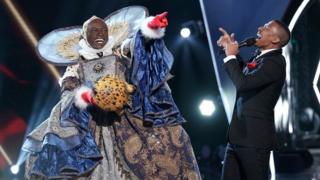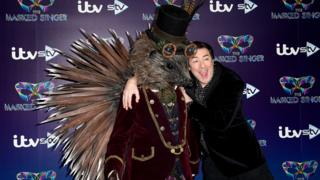This website uses cookies so that we can provide you with the best user experience possible. Cookie information is stored in your browser and performs functions such as recognising you when you return to our website and helping our team to understand which sections of the website you find most interesting and useful.
A complaint often voiced about celebrities on reality shows is that many viewers have no clue who they are.
The latest addition to the genre takes that idea and runs with it by keeping the identity of its celebrities a closely guarded secret.
On The Masked Singer, mystery performers belt out pop songs while wearing elaborate face masks and costumes that conceal every inch of their anatomies.
It is left to a panel of (unmasked) celebrities to guess who they are, based solely on their vocal stylings and cryptic hints delivered in a distorted voice.
When it launched in 2015 in South Korea, the show originally known as The King of Mask Singer was a ratings and viral sensation.
Alternative versions followed in other Asian countries, with US, Australian and French iterations reaching screens in 2019.
The US version was particularly starry, with Gladys Knight, Donny Osmond and Ricki Lake eventually unveiled as the mystery voices beneath the masks.
For the winner of the first series, rapper and auto-tune enthusiast T-Pain, it was an opportunity to show audiences there was a good singing voice underneath the special effects his fans were used to.
 Image copyright Getty Images
Image copyright Getty ImagesNow it's the UK's turn to speculate which household name has taken to the stage dressed as a butterfly, octopus, hedgehog or duck.
Each episode climaxes with a notable person being unveiled - a big reveal that ITV is understandably hoping to keep under wraps until the moment of transmission.
Only a small number of audience members were permitted to see the unveilings when the shows were filmed last year.
"There's always a chance of it getting out but I hope it won't," says Jonathan Ross, one of the celebrity detectives who make up the four-strong panel.
"It's a great idea for a show, although when you see it written down on paper you wouldn't necessarily say it's going to work."
According to Davina McCall - who will join Ross, singer Rita Ora and US comic Ken Jeong on the panel - the show was "a no-brainer".
"I fell in love with the costumes," she says of the show's most eye-catching element - one she suggests is pivotal in persuading celebrities to take part.
 Image copyright PA Media
Image copyright PA Media"The celebrities loved being anonymous and going out there as anyone they wanted to be," the former Big Brother presenter says. "It's an opportunity to reinvent yourself."
"One is a successful performer who struggles with being a public person," says Ross. "Having a mask on made them able to shine and perform better than ever before."

The BBC's Steven McIntosh attended a recording of The Masked Singer in September. Here's what he saw - and what he didn't.
It's difficult to recall a studio audience so frustrated by a TV show recording.
Not because those present at a September taping of The Masked Singer didn't enjoy the show. Far from it - most cheered, laughed and evidently thought it was great entertainment.
But the audience (which BBC News was a part of) sat through several hours of recording and reshoots, only to be told just before the end that they all had to leave as producers filmed the crucial moment where the evicted celebrity was unmasked.
Only a select few members of the public were allowed to stay.
In an age of social media spoilers, keeping the studio audience in the dark is one of several measures ITV has taken to keep the identities of its masked celebrities under wraps.
Audience members had to sign NDAs (non-disclosure agreements) on their way in to the taping, which took place at a remote airfield away from the press and public.
But the efforts to avoid word getting out could be worth it for the viewing figures ITV will be hoping it brings in.
Unlike The X Factor or The Voice, The Masked Singer isn't so much a singing contest as a fun guessing game - evidenced by the fact that most of the judges are entertainment personalities rather than music industry figures.
ITV will be hoping the new and unusual format will be a breath of fresh air in the increasingly tired and saturated talent show market.
Jeong, a panellist on both the US and UK versions, describes his role as being "a bit of an enlightened idiot".
Yet he claims to being surprised how many participants on the UK show he already had some knowledge of.
"I recognised more than I thought I would," he tells the BBC, saying it was "beyond a dream come true" to be invited across the Atlantic.
"I'm in a different country with different people on a different soundstage, but the energy is remarkably similar," the star of the Hangover film trilogy adds.
"I hope the British will love it as much as everyone else," says presenter Joel Dommett. "It's so joyous and tongue-in-cheek."
"You've got great singers, great costumes and it moves along well," adds chat show host Ross. "I think it will be successful as a big family show."
It remains to be seen whether the UK show will feature contestants of a similar calibre to those in the US.
But Ross promises viewers will see "genuine international stars" before its debut run is over.
The Masked Singer begins on ITV on 4 January.
Follow us on Facebook, or on Twitter @BBCNewsEnts. If you have a story suggestion email entertainment.news@bbc.co.uk.



 Africana55 Radio
Africana55 Radio 
